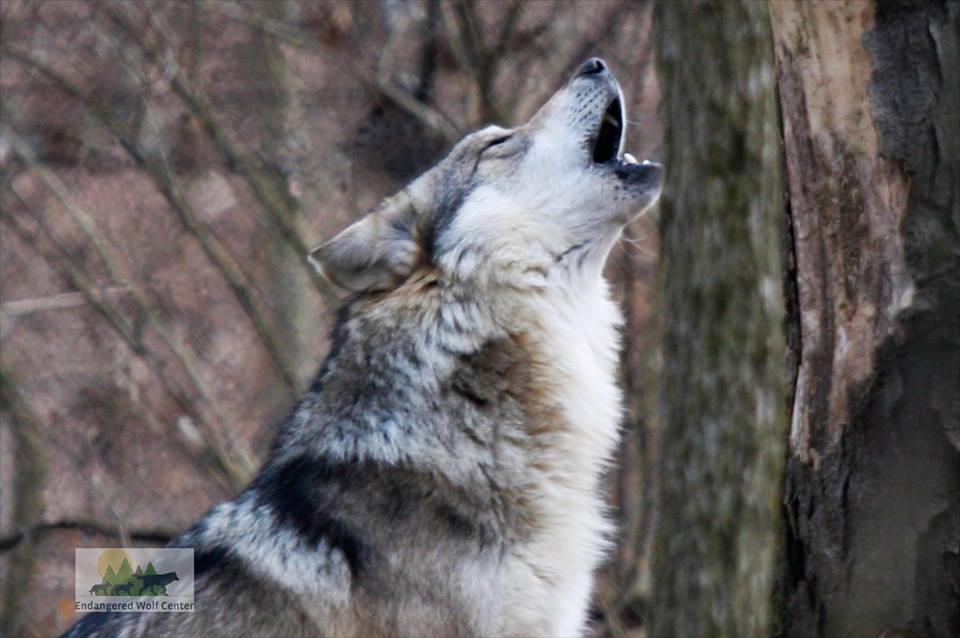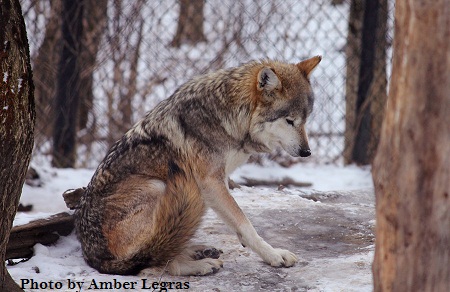In the News: 3 Mexican wolves to be removed
 By Lauren Villagran / Journal Staff Writer – Las Cruces Bureau
By Lauren Villagran / Journal Staff Writer – Las Cruces Bureau
LAS CRUCES — Wolves and cattle ranchers have come head to head again in the Gila and Apache national forests.
Attacks on livestock have prompted the U.S. Fish and Wildlife Service to issue orders to remove three Mexican wolves from the New Mexico and Arizona land where the endangered species is being reintroduced, according to internal memorandums.
The service says its goal is to capture the wolves alive and hold them in captivity, likely in one of the service’s 52 breeding facilities in the U.S. and Mexico.
Michael Robinson, a conservation advocate with the Tucson, Ariz.-based Center for Biological Diversity, says the removals threaten the wolf population at a sensitive time.
“This is a population that has struggled from the outset, not for biological reasons but for political reasons,” he said.
The latest census, from January, counted 75 wolves roaming the national forests and the Fort Apache Indian reservation, although the service confirmed three wolves have already been removed this year.
Wolves travel in packs, often over long distances in search of food. That pits them against the ranchers that graze cattle on the same lands.
Wolves of the Fox Mountain pack killed two cows and six calves between December 2012 and August, according to the service. The agency’s order for their removal came in August and was extended another 60 days on Oct. 1.
Two wolves belonging to the Paradise pack — a male and female pair that bred pups for three years through 2011 — killed four calves between June and August, according to the service.
Robinson said the female is believed to be still fertile. There are currently three breeding pairs in the Mexican wolf population, he said, down from a high of six pairs in the mid-2000s.
In its orders, the service makes note of everything it did before ordering the wolves’ removal. That includes setting out “diversionary food caches” — a dinner alternative far away from grazing areas — and dispatching range riders to monitor the wolves.
The Fish and Wildlife Service holds between 260 and 300 wolves in breeding captivity.
*********************************************************************************************************************************************
There are three  ways you can help these critically endangered Mexican wolves:
ways you can help these critically endangered Mexican wolves:
1. Write a letter to the editor responding to this article
2. Make calls to ask the US Fish and Wildlife Service to keep these three wolves in the wild where they belong.
3. Submit comments on the USFWS proposal that threatens the survival and recovery of Mexican wolves.
The letters to the editor page is one of the most widely read, influential parts of the newspaper. One letter from you can reach thousands of people and will also likely be read by decision-makers. Tips and talking points for writing your letter are below, but please write in your own words, from your own experience. Do not try to use all of these; rather focus on a few key points.
These wolves should be kept in the wild.
- Wolves are social animals that rely on family members in hunting and pup rearing. Trapping or darting these wolves, and removing them forever, will disrupt their family pack structure, which research has shown leads to more livestock issues, not fewer.
- Trapping or darting will place these wolves and all of the wolves around them in danger, since capture carries a high risk of accidental death or injury.
- Since 1998, the government has removed 54 wolves from the wild. Most were trapped and 13 were shot by predator-control agents. Taking more wolves from the small, critically endangered wild population is unacceptable.
The US Fish and Wildlife Service should release many more wolves, not remove them.
- At last count, just 75 Mexican wolves including three breeding pairs survived in the wild, making them the most endangered mammal in North America, and the most endangered wolf in the world.
- If the USFWS is truly concerned about the growth of the population and its genetic health, the answer is more releases of captive wolves, not more wild wolves lost to risky trapping operations and permanent captivity.
- Wolves are a benefit to the West and are essential to restoring the balance of nature.
- Polling shows an overwhelming majority of Arizona and New Mexico voters support Mexican wolf recovery.
Removing or killing critically endangered Mexican gray wolves is not the solution to livestock conflicts.
- There are many solutions to conflicts between livestock and wolves, but there are very few Mexican gray wolves.
- Livestock businesses on public lands are reimbursed for losses and can receive government and non-profit assistance for non-lethal proactive measures to avoid depredation-they have a responsibility to do so.
- Deterrents to livestock conflicts are the solutions, not removing more endangered Mexican wolves from their homes.
Make sure you:
- Thank the paper for publishing the article.
- Include something about who you are and why you care: E.g. “I am a mother, outdoors person, teacher, business owner, scientific, religious, etc.”
- Provide your name, address, phone number and address. The paper won’t publish these, but they want to know you are who you say you are.
- Keep your letter brief.
Talking points, phone numbers and other contact information are here.
At the same time the USFWS is attempting to trap these wolves, it is taking comments on proposal to change Mexican wolf management. Part of the proposal could help get more wolves into the wild, but most of it threatens the Mexican wolf’s continued survival and recovery. Your comments are needed to help lobos survive beyond the current crisis. Talking points and information on how to submit your comments are here.
Click here to join our email list for Mexican gray wolf updates and action alerts.
Visit us on Facebook here.



